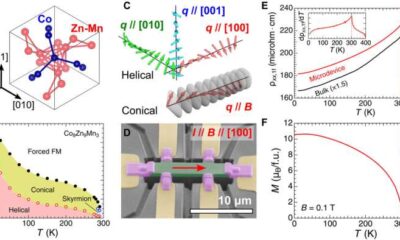Health
NIH’s “Scientifically Justifiable” Phrase Sparks Controversy

The phrase “scientifically justified” has sparked significant debate following its repeated use in statements by Jay Bhattacharya, Director of the National Institutes of Health (NIH). In her analysis for *The Atlantic*, Katherine J. Wu highlights concerns regarding the lack of formal criteria associated with this demand, suggesting that the call for scientific justification might lead to subjective interpretations of research.
This controversy arises against a backdrop of increasing scrutiny over NIH-funded studies. Wu points out that the term “scientifically justifiable,” while seemingly clear, lacks precise definitions, leaving room for political interference in research decisions. The uncertainty surrounding this phrase raises questions about the integrity of scientific inquiry within the NIH framework, particularly as the landscape of health research evolves in 2025.
Concerns About Funding and Research Integrity
The implications of this discussion extend beyond mere semantics. The insistence on research being “scientifically justifiable” is seen as insufficient to ensure the credibility of studies, especially as instances of political meddling in scientific research become more prevalent. This shift could potentially undermine public trust in the NIH, an institution that has historically been viewed as a cornerstone of scientific advancement in the United States.
In a different context, John Herrman, writing for *Intelligencer*, explores the competitive landscape for top talent in artificial intelligence. His analysis reveals that while the demand for AI engineers is skyrocketing, one company stands out: Meta. Herrman notes that Meta’s willingness to offer nine-figure salaries to attract talent is unmatched, emphasizing the company’s unique position within the industry.
Financial Implications of Cash Transfers
Meanwhile, in the realm of social policy, Naomi Schaefer Riley discusses the effectiveness of unconditional cash transfers in a piece for *The Boston Globe*. A recent study found that providing low-income mothers with cash payments of $333 shortly after childbirth did not significantly impact their children’s development by age four. This finding aligns with existing evidence suggesting that increased financial resources do not alleviate the inherent stresses of parenting.
As societal challenges mount, Mary Anna Mancuso addresses the erosion of property rights and individual liberty in Miami in her commentary for the *Miami Herald*. Mancuso argues that residents are witnessing a decline in their investments, which she describes as essential to the American Dream. She urges the Republican Party to focus on issues that resonate with the working class, emphasizing the need for policies that promote affordability and opportunity.
The discussions surrounding these topics reflect broader concerns about the intersection of science, economics, and social policy. As stakeholders navigate these complex issues, the outcomes will likely shape the future landscape of research funding, workforce dynamics, and social support systems.
-

 Technology5 months ago
Technology5 months agoDiscover the Top 10 Calorie Counting Apps of 2025
-

 Technology3 weeks ago
Technology3 weeks agoOpenAI to Implement Age Verification for ChatGPT by December 2025
-

 Health3 months ago
Health3 months agoBella Hadid Shares Health Update After Treatment for Lyme Disease
-

 Health4 months ago
Health4 months agoAnalysts Project Stronger Growth for Apple’s iPhone 17 Lineup
-

 Health4 months ago
Health4 months agoErin Bates Shares Recovery Update Following Sepsis Complications
-

 Technology5 months ago
Technology5 months agoDiscover How to Reverse Image Search Using ChatGPT Effortlessly
-

 Technology3 months ago
Technology3 months agoElectric Moto Influencer Surronster Arrested in Tijuana
-

 Technology5 months ago
Technology5 months agoMeta Initiates $60B AI Data Center Expansion, Starting in Ohio
-

 Technology2 months ago
Technology2 months agoDiscover 2025’s Top GPUs for Exceptional 4K Gaming Performance
-

 Technology5 months ago
Technology5 months agoRecovering a Suspended TikTok Account: A Step-by-Step Guide
-

 Health5 months ago
Health5 months agoTested: Rab Firewall Mountain Jacket Survives Harsh Conditions
-

 Lifestyle5 months ago
Lifestyle5 months agoBelton Family Reunites After Daughter Survives Hill Country Floods





















